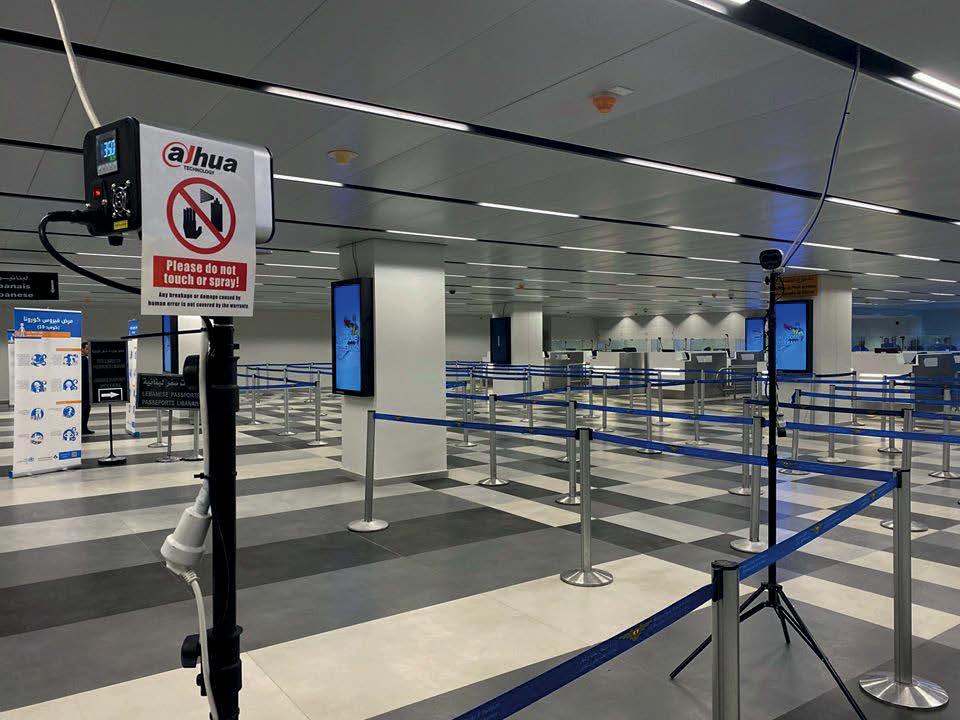
9 minute read
Not the time for making contact?
No time for public scanners?
How often has your workplace sanitised its fingerprint scanner, office door pin pad or access gates before now? I’d imagine the answer is: not very often. But as we all reassess everything that we touch amid the current pandemic, many organisations around the world are finding themselves having to disinfect pin pads and secure fingerprint readers on office doors or secure facilities. This uncertain time has made it painfully clear that the access devices we all touch are no longer adequate.
Advertisement
Yet at the same time, businesses in the UK are reportedly spending more than two months resetting staff passwords and a further chunk of time replacing employee pass cards that have been lost, stolen or misplaced. Of course, data and information protection is still important for all businesses today, thanks to the heavy fines given for GDPR breaches. On top of that, the rise of the ‘bring-your-own-device’ trend —which more than 46% of business have claimed to have already adopted — has increased security risks and made corporate passwords not fit for purpose.
So, a more secure solution to workplace access is needed. Gartner predicts that by 2022, 40 percent of businesses plan to adopt biometric technology for information security. But it’s important that it must be a technology that provides security, hygiene and convenience for both businesses and end users. David Orme of IDEX Biometrics ASA says now is the time to say goodbye to fingerprint scanners
Making role-based access control unique The answer is individual role-based access control. Fingerprint access has often been used to bolster security for high-security areas in this way. This is important to help businesses embrace the ‘zero trust model’ in the workplace and ensure that sensitive corporate information and office spaces remain protected. But with health concerns front of mind, it’s now important that businesses do this without having to rely on communal fingerprint sensors or hand scanning devices.
So, instead of resorting to a reader-based sensor, fingerprint biometric authentication is
best introduced on individual employee ID cards. This means each user can confirm their identity, role and level of access, by scanning their fingerprint on their own personal card –removing the need for shared devices.
Of course, it’s also crucial to ensure personal data security. During card registration, or the work onboarding process, the employee’s fingerprint image can be scanned by the biometric card sensor and then converted into a biometric template. The template is then encrypted and stored in the secure element in the card’s chip. This means the personal data never leaves the ID card - and isn’t stored on a central database. So, if the smart card is stolen, the templates cannot be hacked or reveal the user’s biometric fingerprint.
The biometric pass card will also remove the ability for employees to share passwords and ID cards, while boosting authentication accuracy and reducing friction.
The smart workplace A biometric access card doesn’t just increase security and prevent users having to scan their fingerprint on grubby reader devices. When combined with a smart workplace, it can also increase the level of personalisation an
(continued from previous page)
employee can experience throughout the office and reduce the need for mundane processes.
A smart workplace utilises IoT technology — such as sensors, connected devices and networked platforms — to streamline, and even

enhance the office experience. With a biometric fingerprint ID card, a smart office can recognise the employee as they move around, meaning they can work more efficiently, minimising workplace disruptions and improving their working day.
For instance, do you like your meeting room warmer, brighter, or quieter than everyone else? Swiping into the room with your personal, fingerprint-authorised access card can automate



your preferences, saving you time and thinking space. You can focus on the task at hand, and your businesses can focus on customers.
Keeping safe and secure Smart offices powered by biometric access control cards will personalise the office day, save enterprises countless hours resetting employee passwords and reduce the risk of lost or stolen access cards — all while maintaining personal hygiene when we most need it.
Not only will fingerprint biometric ID cards only let the right person into the building, or onto the network, but it will also ensure there is less spread of shared contact on fingerprint or hand sensors in the future.
In this uncertain time, we are all looking to our workplaces to guide us and keep us safe at work. By saying goodbye to public fingerprint scanners and combining biometrics with individual work security passes, workplaces of the future will see improved levels of hygiene, convenience and security.

Set goals for your service business
In this article in the series on growing your service business, Jim Rathbone now looks at the importance of setting goals.
Goals keep us energised and focused on what we are trying to achieve, as these three quotes by well-known people show:
“What keeps me going are goals” - Muhammad Ali
“Setting goals is the first step in turning the invisible into the visible” - Tony Robbins
“One of the lessons that I grew up with was to always stay true to yourself and never let what somebody else says distract you from your goals” - Michelle Obama
With this in mind, I would encourage you to develop service goals in five key areas:
1. Increase the value of your annual service contract base
Confirm the value of your current service contract base and set a goal for growing this over the next 12 months and the next three years. This will inevitably lead you to the next question: What will you do new or differently to achieve these goals? Who will do these activities and by when?
2. Increase service works sales
What is your current value of service works? This is often grouped with installation project sales and not measured separately. Until this is tracked and measured through your accounting system it is impossible to set a goal. Start with measuring.
3. Improve service gross profit
measure the service gross profit coming from the combined total of the service revenue streams: maintenance and monitoring contracts; reactive call-outs and service works. Again, it is good to start measuring and then set the improvement goal and the needed actions to achieve it.

4. Improve customer service
Which elements of the customer service experience are you measuring? These might be: • Annual service contract attrition % • Monthly Cancelled contract value • Call out 1st time fix % • No of outstanding PMs • No of goodwill call outs • No of complaints/ issues
Set goals to improve with your service department
5. Increase engineer productivity
Measure the number of service visits per engineer and as a service department and set goals to improve with your service department.
Installers who have developed a healthy recurring service income stream are more likely to survive the business shockwaves of COVID-19. Take advantage of this period to develop your plan to grow your service business.
Jim Rathbone is the Managing Director of Rathbone Results which supports security installers to increase profits and grow recurring income jim@rathboneresults.com


THE PSI GOLF DAY 2020

We hope you will be able to join us at Luton Hoo this year for a round of golf, awards dinner or both! For more details on taking part contact David Lewis on 0208 295 8309.
This year the PSI Golf Day and Premier Awards are being held at Warren Weir at Luton Hoo. Why not come and join us for the day on 8th October?
This year the PSI Golf Day is being held at Warren Weir at Luton Hoo in Bedfordshire, a 7,107 yard long and par 73 course offering a harmonious blend of inland links and mature parkland, meandering through the estate.
Warren Weir nestles within the 1,065 acre grounds of Luton Hoo Hotel, Golf & Spa and is a self-contained private event venue with 84 luxurious bedrooms and suites.
The event will take place on the 8th October, with golf during the day and the PSI Premier Awards in the evening afterwards. Following the

Previous winner Tim Northwood with Ray Parlour

meal and presentations there will be afterdinner entertainment and a chance to unwind in the Warren Lounge afterwards.
The Golf Competitions During the day, the annual PSI Golf Day will pit the skills of the industry’s golfers against each other in Texas Scramble and Stableford competitions. Every year installers, manufacturers and suppliers compete for the prestigious trophies and enjoy all-day refreshment and catering in glorious surroundings with great company.
For those looking to stay overnight, Warren Weir has rooms to meet all requirements as well as those in the in the Parkland and Country Club. To book your accommodation please contact 01582 698887 mentioning the PSI Golf Day.
A day to remember for all competitors and their guests - especially the winners!




















